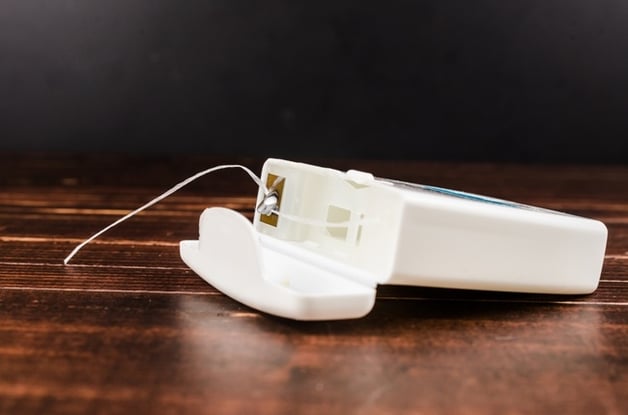
"Have you been flossing daily?" It's a question nearly all patients are asked when they attend their regular dentist appointments, and according to a recent survey, many people are lying when they give their answers. The poll conducted on behalf of the American Academy of Periodontology revealed that nearly 25 percent of U.S. adults are dishonest with their dentists about how often they floss.1 Additionally, almost 36 percent of respondents would rather do an unpleasant activity, such as clean a toilet or sit in gridlock traffic, than floss their teeth.
Remember, the process doesn't take very long and flossing daily is a crucial element of proper oral care. Here's why you need to floss on a regular basis and how to do it:
"U.S. adults are dishonest about how often they floss."
Defining floss
Floss is a long strand of typically nylon filaments and plastic monofilaments.2 It comes in waxed or unwaxed versions, though either form is just as effective as the other. Waxed floss typically slides easier between the teeth and can be more comfortable when wrapped around your fingers. On the other hand, unwaxed floss will squeak against clean teeth, which can serve as an indicator when plaque has been fully removed.3 There are other interdental cleaners available that serve the same purpose, but floss is flexible, making it more effective at cleaning hard-to-reach places in the mouth.
Purpose of flossing
Though brushing twice a day is an important part of your dental care routine, it's not enough to keep your mouth at its optimal health. Brushing with fluoridated toothpaste removes plaque and other bacteria from the front, top and back of the teeth, but the bristles can't reach between them. That's why flossing is so crucial.
The purpose of flossing daily is to remove plaque and food particles under the gumline and between your teeth.4 If plaque is left to build up in these spaces, it could harden into tartar and cause tooth decay. The resulting bacteria can cause inflammation and lead to gum disease, which can be harmful to not only your mouth, but your overall health.
Without flossing, you have no defense against bacteria growth between your teeth, and that part of the tooth is just as important as all the other sides. In comparison, it would be as if you only brushed the top of your teeth and never the front, which, of course, doesn't make sense for maintaining your oral health.
How to floss
It's important to floss daily and do it correctly. First, break off about an 18-inch-long string of floss. Wind the ends of the floss around your middle fingers, leaving about two inches of floss between them. Holding it taut with your index fingers and thumbs, gently slide the floss between your teeth, working it in a back and forth motion. Slide it down below the gum line, but be gentle, as forceful and quick motions could damage your gum tissue. Move the floss back up in the same manner. Repeat this process between all of your teeth, using clean sections of floss as you go.
There's no hard-and-fast rule as to what time of day to floss, it's just important that you do it. However, many people floss at night to remove the food particles that have collected throughout the day.

Be honest with your dentist so he or she can give the proper care.
Visiting the dentist
If you don't floss your teeth on a regular basis, your gums are more likely to bleed and become inflamed when you first start practicing this vital oral care regime. Avoid flossing for the first time right before heading to the dentist's office, as swollen gums can prevent dental health professionals from properly viewing your teeth. Additionally, if you haven't been keeping up with this daily routine, you may experience gum sensitivity when your dental health team flosses your teeth during the cleaning.
Finally, when asked if you floss daily, be honest with your dentist. He or she needs to have a full understanding of your health in order to provide the best care possible. Take that opportunity to ask for dental care tips so you can maintain a healthy smile.
____________________________________________________________________
1. "More than a quarter of U.S. Adults are dishonest with dentists about how often they floss their teeth," American Academy of Periodontology, June 23, 2015. https://www.perio.org/consumer/quarter-of-adults-dishonest-with-dentists
2. "Learn more about floss and interdental cleaners," American Dental Association. http://www.ada.org/en/science-research/ada-seal-of-acceptance/product-category-information/floss-and-other-interdental-cleaners
3. "Facts about flossing," Delta Dental. https://www.deltadentalins.com/oral_health/flossing3.html
4. "How to floss," Colgate. http://www.colgate.com/en/us/oc/oral-health/basics/brushing-and-flossing/article/how-to-floss

